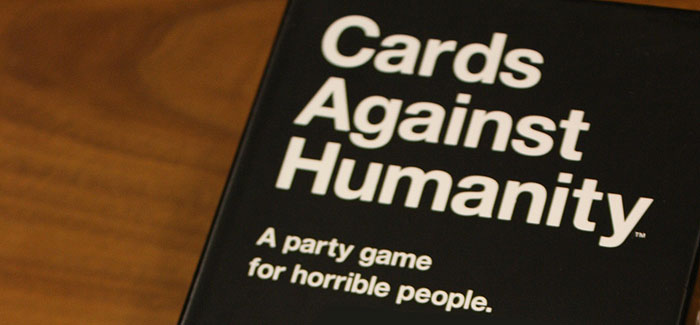
Weinstein and his partners stack the decks against decorum. (Photography by Joy Olivia Miller)
Does the popularity of Cards Against Humanity mean everyone’s horrible?
You might describe the middle of 2011 as kind to Eliot Weinstein, AB’11, or memorable, or life changing. He might deem his late spring like “Being on fire” or “Getting drunk on mouthwash.”
That June, before the nerdy, well-spoken kid graduated from the College, he and some high school friends sold the first copies of a game they’d invented called Cards Against Humanity. The self-described “party game for horrible people” is a foul-mouthed Mad Libs for the thoughtful and/or inebriated.
Launched after a quick $15,000 fundraising campaign two years ago, Cards Against Humanity kudzued to the top of the best-rated toys and games list on Amazon.com. “We’ve kind of gone from zero to 60 really quickly in the last year and a half,” Weinstein says. “When we started, we started very small and now we’ve made serious money.”
When they’re not sold out, there are three Cards Against Humanity products regularly for sale on Amazon: the original deck of 550 cards and two 100-card expansion packs. Each has a lot of white cards and fewer black cards. Black cards ask questions, like “How did I lose my virginity?” White cards provide answers. In a standard round, one player draws a black card and reads it aloud, then everyone submits a white card from their hand to answer it—for instance, “Poor life choices” or “Puppies!” The questioner reads all the submissions aloud and picks the winner.
Sometimes it’s a punchy pop culture reference that wins a round (B: War! What is it good for? W: RoboCop.), and the sad-but-true always does well (B: What don’t you want to find in your Chinese food? W: Horse meat.). Generally the combination that gets the room laughing does best. Swap a couple of the answers above and you see how Cards Against Humanity can take on the air of Curb Your Enthusiasm at its most button pushing, especially when the cards are not as innocuous. If Curb Your Enthusiasm is Seinfeld without the network-television restraint, then Cards Against Humanity could be considered the pay-cable version of the similar, but tamer, Apples to Apples.
As with Curb, the game’s not for everyone. Weinstein remembers an e-mail from a fan who liked the game but thought a card referring to the 2007 shooting at Virginia Tech crossed the line. Yet, he says, e-mail requests arrive from around the world almost daily, asking for translations and nation-specific cards, which Canada already has. “People want to laugh at horrible things,” he says. It appeals to those with “a twisted sense of humor or something in common with us,” meaning the eight-person roundtable that’s still testing, marketing, and producing the game.
That group conceived of Cards Against Humanity at a New Year’s party in a suburb north of Chicago as a way to break the ice. Friends from Highland Park High School, they refined the concept and put it on crowdsourcing website Kickstarter, where in two months it racked up 389 percent of what they said they needed to fund the project. Every donation purchased at least a digital version of the game. The group built up its roster of cards and discussed pricing models over frequent conference calls. Weinstein says he treated the project like another RSO. Now it’s a side job as he applies to economics PhD programs.
The business model is an experiment in pricing. Cards Against Humanity is available for free download on the game’s website. Alternatively, you can buy a hard copy for $25. Ask Weinstein if the game is profitable and you’ll get a chuckle. The team won’t release their financial data, but they did publish earnings statistics online for a recent 30-card holiday pack released on a pay-what-you-will model. Averaging just $3.89 paid per pack, the release still earned around $70,000. Profits on the hundreds of thousands of sets that have been sold at full price probably make that sum look paltry.
No matter whether you think free markets are better than “Edible underpants” or are for horrible people, it’s hard to argue against a product that’s free and can still pay a kid’s way through graduate school.
